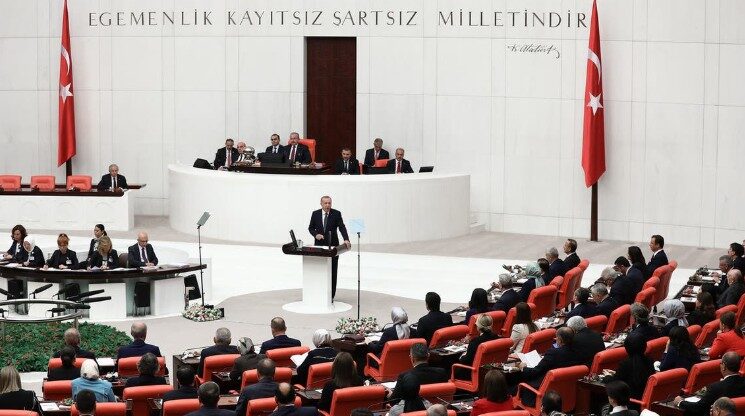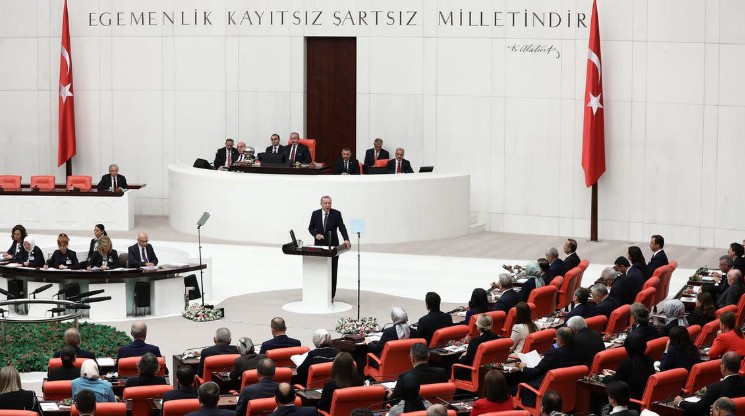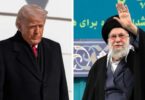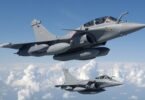Ankara Extends Its Reach and Authority
The Grand National Assembly of Turkey (Türkiye Büyük Millet Meclisi or TBMM) has approved a three-year extension of Ankara’s authority to conduct cross-border military operations in Syria and Iraq. This empowers President Recep Tayyip Erdoğan with authority to decide on the “scope, timing and duration” of operations to deploy troops abroad and to also authorize foreign forces to operate internally within Turkey. This will be the longest mandate since Turkey’s cross border intervention in 2016. The cross-border mandate according to the Turkish Minute was first authorized on 2 October 2014, which has authorized Turkish troops to conduct operations against groups identified as threats to Turkey’s national security.
According to reports, the recent motion to renew the extension was supported by the ruling Justice and Development Party (AKP), the Nationalist Movement Party (MHP), and two smaller partners. It was passed despite strong opposition from the Republican People’s Party (CHP) and the Peoples’ Equality and Democracy Party (DEM Party).
The law authorizes the Turkish president to bypass parliamentary review until 2028. This move can be viewed as the erosion of checks and balances and concentrates foreign and defence policymaking entirely in the presidency.
Strategic Continuity in Turkey’s Cross-Border Military Policy
Since 2016, Turkey has steadily increased its military influence in northern Syria through a series of large-scale operations, Euphrates Shield, Olive Branch, and Peace Spring. These were targeted at countering and defeating the Islamic State (ISIS) initially. However, it was noted that the same operations were utilized to prevent the formation of a Kurdish autonomous region led by the People’s Protection Units (YPG), which Ankara views as an affiliate of the Kurdistan Workers’ Party (PKK).
According to verifiable reports, Turkish troops and the National Intelligence Organization (Milli İstihbarat Teşkilatı or MİT) personnel are currently operating alongside the Syrian National Army (SNA), a coalition of opposition groups supported by Ankara. Turkish-backed local administrations use the Turkish lira, manage border crossings, and receive direct support from Turkish ministries for health, education, and municipal services.
“Turkey has effectively built semi-permanent zones of influence in northern Syria,” explains Dr. Aslı Aydıntaşbaş of the European Council on Foreign Relations. “These areas serve as both security buffers and tools of political leverage.”
Ankara describes these areas as “safe zones” designed to counter attacks and allow the resettlement of Syrian refugees. However, security remains fragile, with frequent conflicts among local militias and sporadic bomb attacks.

The Turkish government in a written justification cites continuing threats from the PKK, YPG and ISIS. According to its citations, terrorist outfits have continued to plan attacks from across the border and that Syria’s fragmentation prevents lasting stability in the region. The text also emphasized on Turkey’s contribution to clearing landmines, preventing the use of chemical weapons and supporting reconstruction efforts in both Syria and Iraq. The Officials stated that the extension aids the flexibility for military planning and continuity in regards to counterterrorism operations. They argued that shorter authorizations would be contrary to stability efforts in the area and limit the military’s ability to respond swiftly to threats.
“Flexibility is essential for Turkey’s defence strategy,” says Murat Yeşiltaş, security analyst at the pro-government SETA Foundation. “The regional dynamics — from U.S. troop movements to Russia’s role in Syria — can change overnight. A longer mandate allows for uninterrupted military readiness.”
This recent move ensures Turkey’s expanded presence while also providing it a diplomatic leverage. A territorial control along the Syrian border, positions Ankara as an important player in negotiations with Russia, the United States, and Iran.
According to Dr. Gonul Tol of the Middle East Institute, “Turkey’s military presence has become a bargaining chip in every major regional negotiation — from refugee management to post-war reconstruction.”
Domestic Politics and Power Consolidation
The timing and length of the new mandate has drawn attention for their domestic political implications. The extension of military authorization until 2028 effectively secures Erdoğan’s foreign policy from parliamentary change for the next three years, even if the upcoming elections shift the balance of power.
Since the 2018 transition to a presidential system, the Turkish executive has gained much control over defence and diplomacy. Critics argue the parliament’s role has become largely symbolic contrary to being effective or active in regards.
“This isn’t just a security policy — it’s a political strategy,” said CHP spokesperson Faik Öztrak. “By extending the mandate, the government is removing one of the last institutional checks on presidential power.”
Analysts infer the move as part of Erdoğan’s broader effort to centralize authority and maintain foreign policy continuity amid domestic challenges, including inflation, economic pressures, and voter fatigue.
Security Meets Demography- The Refugees
Turkey continues to host more than 3.3 million Syrian refugees. The government links its military operations to “safe zone” resettlement projects across the border, promising voluntary returns and improved infrastructure.
Turkish-backed municipalities have funded housing developments, schools, and industrial sites in northern Syria and continues to present it as a humanitarian and security solution. However, independent monitors report ongoing insecurity, unstable governance, and sporadic clashes that undermine the sustainability of these projects.
“Conditions remain unstable,” notes Elizabeth Tsurkov, Syria analyst with the New Lines Institute. “Many refugees fear returning to areas that lack reliable safety, services, or economic opportunity.”
The government Insists that repatriations are voluntary, but humanitarian groups warn that Ankara’s emphasis on “safe zones” risks normalizing indefinite occupation under the banner of refugee resettlement.
Strategic Resilience, Political Risk
The extended mandate embodies Turkey’s evolving foreign policy doctrine — one rooted in strategic depth, self-reliance, and forward defence. Supporters argue that it ensures long-term stability along Turkey’s borders. Critics counter that it institutionalizes open-ended military engagement and normalizes executive overreach.
“Ankara’s Syria policy has outgrown its initial purpose,” Aydıntaşbaş observes. “What was once framed as a temporary security operation has become an integral part of Turkey’s regional identity and domestic politics.”
Turkey’s Strategic benefit:
The mandate will allow Turkey to secure a buffer zone which will insulate its border provinces (Gaziantep, Kilis, Şanlıurfa) from cross-border attacks and strengthens internal stability.
Through military, administrative, and economic influence, Ankara will effectively manage large parts of Aleppo and Raqqa provinces, where Turkish-backed councils run schools, police, and local services.
Maintaining the military presence will allow Turkey to anchor itself in Syria’s future governance negotiations, giving it leverage in talks with Russia, the United States, and Iran over any settlement process.
This will ensure Turkey as a permanent stakeholder in the Syrian conflict’s resolution, ensuring that any peace deal or reconstruction plan.
The extended mandate reinforces Ankara’s long-standing campaign against the PKK and its affiliates in Syria and Iraq. Operations across both borders disrupt PKK supply routes, camps, and safe zones in the Qandil Mountains and northern Syria. Turkey uses this as part of a broader strategy to prevent the YPG-led Syrian Democratic Forces (SDF) from consolidating autonomous governance structures in north-eastern Syria. This will assist Ankara in preventing the emergence of a Kurdish-controlled region that could reinforce separatist movements within Turkey’s own southeast.
The extension of the mandate also supports Turkey’s broader doctrine of “forward defence” (ileriden savunma) which aims at projecting power beyond its borders to neutralize threats before they reach Turkish soil.
It aligns with Ankara’s ambitions to become a regional military hub, bolstered by its expanding domestic defence industry (e.g., Bayraktar drones, armoured vehicles, and smart munitions). Turkey strengthens its regional deterrence posture while showcasing its military-industrial independence.
Apart from the military gains, Turkey is building soft power through service provision, education, and cultural integration in Syrian regions under its control. Turkish language classes, healthcare programs, and reconstruction projects foster dependency on Ankara’s institutions which will gradually embed Turkish influence in local governance.
In Turkey’s plan to become a dominant external actor in the region’s reconstruction, it is expected that Ankara will utilize its Long-term socio-political plan to gain influence in northern Syria.
More on Turkey:
Pakistan-Turkey Strategic Talks: https://www.thestrategicperspective.org/pakistan-turkey-strategic-talks/
INS Trikand’s Mediterranean Mission: Debunking the Turkish “Ultimatum” Story: https://www.thestrategicperspective.org/ins-trikands-mediterranean-mission-debunking-the-turkish-ultimatum-story/
Ankara seeks Deterrence against Tel Aviv by militarily reinforcing Syria: https://www.thestrategicperspective.org/ankara-seeks-deterrence-against-tel-aviv-by-militarily-reinforcing-syria/
US Blocks Engine Exports for Turkey’s KAAN Fighter Jet: https://www.thestrategicperspective.org/us-blocks-engine-exports-for-turkeys-kaan-fighter-jet/
Turkey-Egypt Agreement to jointly produce VTOL drones in Cairo: https://www.thestrategicperspective.org/turkey-egypt-agreement-to-jointly-produce-vtol-drones-in-cairo/









![Pakistan and Saudi Arabia signed a defence agreement on September 17 in Riyadh [Handout/Pakistan Prime Minister's Office]](https://www.thestrategicperspective.org/wp-content/uploads/2026/01/pak-saudi-145x100.jpg)
